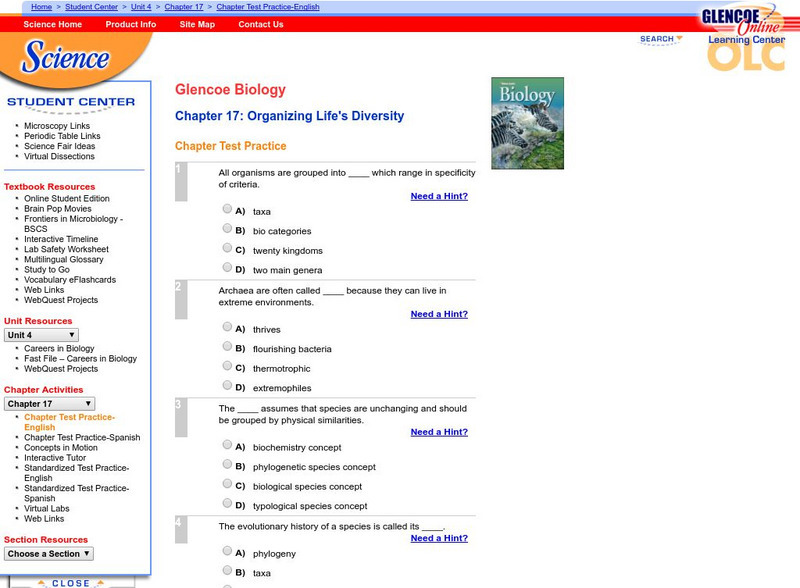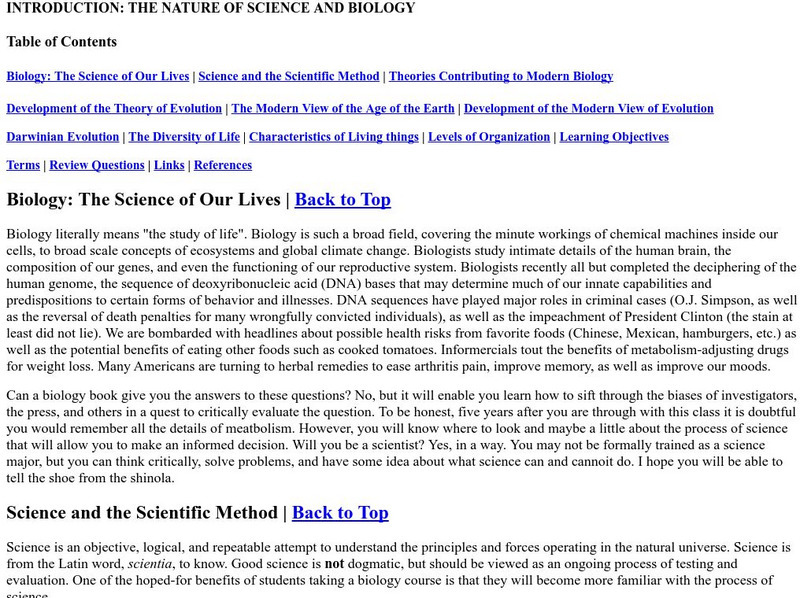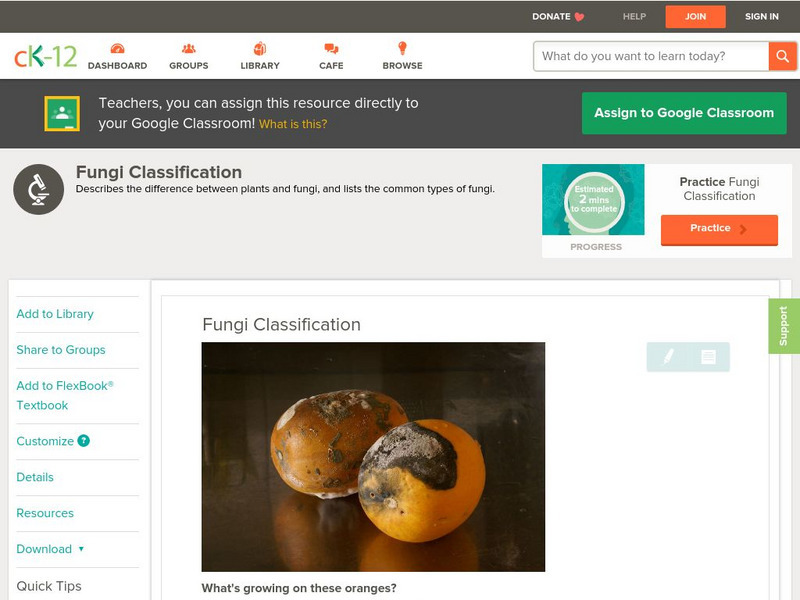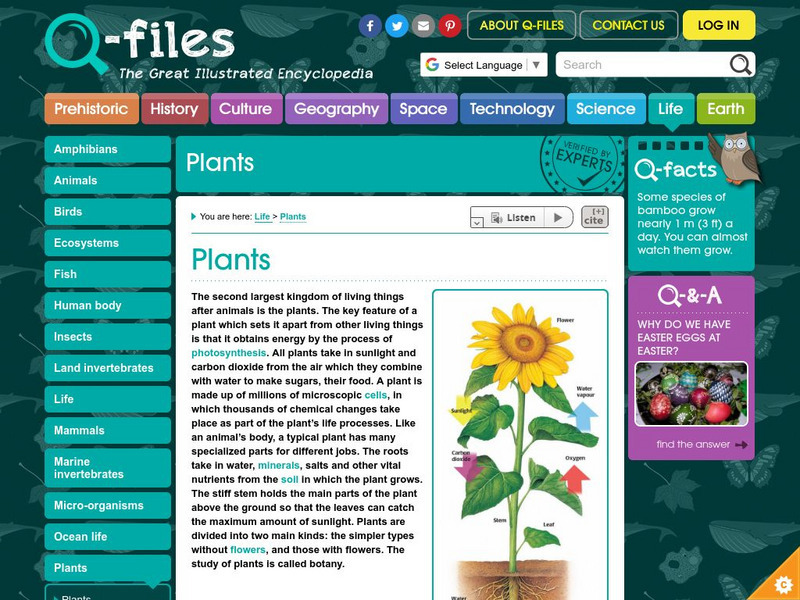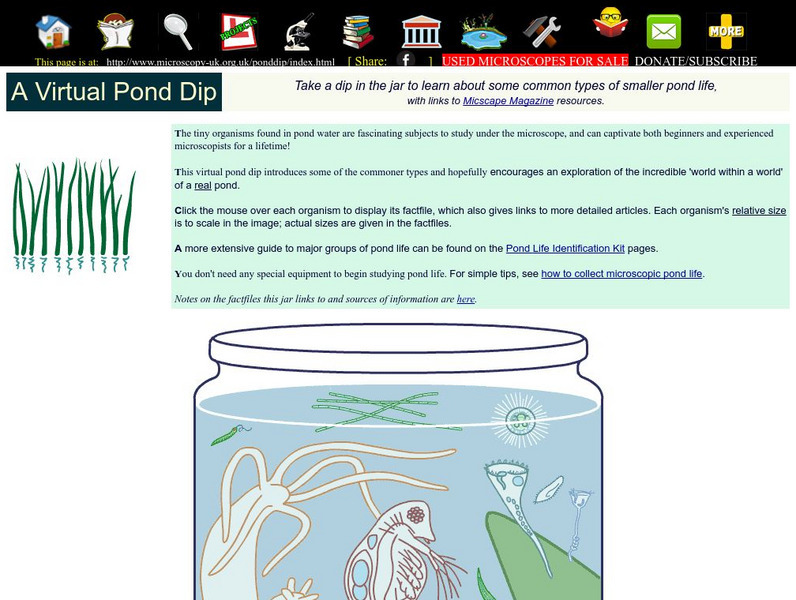Hi, what do you want to do?
Curated OER
Learning in Cockroaches
Young scholars make scientific observations. In this stimulus response lesson, students make observations and collect data to determine if cockroaches can learn. A secondary purpose of this lesson is to provide young scholars with the...
Curated OER
Taxonomy Project
High schoolers act as a taxonomist and, given a certain situation, classify existing organisms.
Curated OER
Global Resources: What Will You Do with Your Power?
Students examine the human impact on natural resources. They read and discuss an article, evaluate nations regarding their environmental problem-solving, develop a presidential speech on the environment, and conduct a natural resources...
Curated OER
Crazy Critters
Eighth graders visit a local park to collect insects. They record the habitats, identify the insect and write a report including the kingdom, phylum, class, and order.
Curated OER
Creepy Critters
Students develop a classification scheme based on the structural features of organisms. In this organism lesson students divide into teams and complete a fun activity.
Curated OER
For Creative Minds: What Makes an Animal a Mammal?
Students read about categories of mammals and their features. Students then construct a marine animal, using given print outs in the lesson. Students then create adaptations for their mammal, using a web site reference for guidance.
Curated OER
Investigating Animals in Water
Pupils observe small animal activity. They identify local water animals and describe the habitats where water animals can be found. Students collect samples to observe in the classroom.
Curated OER
Earthworms
Fifth graders research the earthworm and write a one paragraph report on its anatomy and habitat. They learn about worms and how to dissect them through Video Streaming and virtual dissections, along with actually dissect a worm as...
Curated OER
Bacterial Roles
Students study bacteria and the role it plays in the ecosystem. In this bacteria instructional activity students research the roles bacteria has and submit a chart.
Other
Panhandle Area Educational Consortium: The Six Kingdoms of Life [Pdf]
Scientists look at the evolutionary history of organisms to divide them into kingdoms. For awhile, there has been 5 kingdoms, but many scientist are now using 6 kingdoms.
McGraw Hill
Glencoe Biology: Organizing Life's Diversity: Chapter Test Practice
A fifteen question chapter review covering concepts of the classification of life.
Estrella Mountain Community College
Estrella Mountain Community College: The Diversity of Life
Detailed information about each of the five kingdoms. Each kingdom is separately described, but information is also summarized in a table.
Other
The Domains and Kingdoms of Life
This site is a description of the history behind the 5 Kingdom system suggested by Robert Whittaker. An extensive list of resources is included.
Other
Southwest Tennessee Community College: Classification of Organisms
College-level instructor's notes describing taxonomy. Explanations and images give a chronological history of the science of classifying organisms.
Estrella Mountain Community College
Online Biology Book: The Nature of Science and Biology
Use the scientific reasoning and critical thinking to take an in-depth look at the basics of biology.
Scholastic
Scholastic: Study Jams! Science: Plants: The Kingdoms of Life
A video, a karaoke song to sing along to, and a 7-question multiple-choice quiz on the topic of Kingdoms in the life classification system.
Scholastic
Scholastic: Study Jams! Science: Animals: Kingdoms of Life
A playful interactive introducing biology's five animal kingdoms. Watch the video, take a quiz, and review vocabulary.
CK-12 Foundation
Ck 12: Life Science: Fungi Classification
[Free Registration/Login may be required to access all resource tools.] Scientists used to think that fungi were members of the plant kingdom. They thought this because fungi had several similarities to plants. However, there are a...
Orpheus Books
Q Files: Life: Plants
Explore the world of plants and all that encompasses the second biggest kingdom of classification.
Other
Alternative Classifications of Life
The Linnaean system (1758) classified all macroscopic living organisms as either Animals or Plants, based on whether they moved [anima, with a soul] or not. Thus, Fungi were included as plants. With the invention of the microscope and...
Microscopy UK
Microscopy Uk: A Virtual Pond Dip
In this site, you will be introduced to some of the more common organisms found in a pond. Contains a thorough guide to small and microscopic pond life with links to other descriptive sources.














![Panhandle Area Educational Consortium: The Six Kingdoms of Life [Pdf] Handout Panhandle Area Educational Consortium: The Six Kingdoms of Life [Pdf] Handout](https://static.lp.lexp.cloud/images/attachment_defaults/resource/large/FPO-knovation.png)
